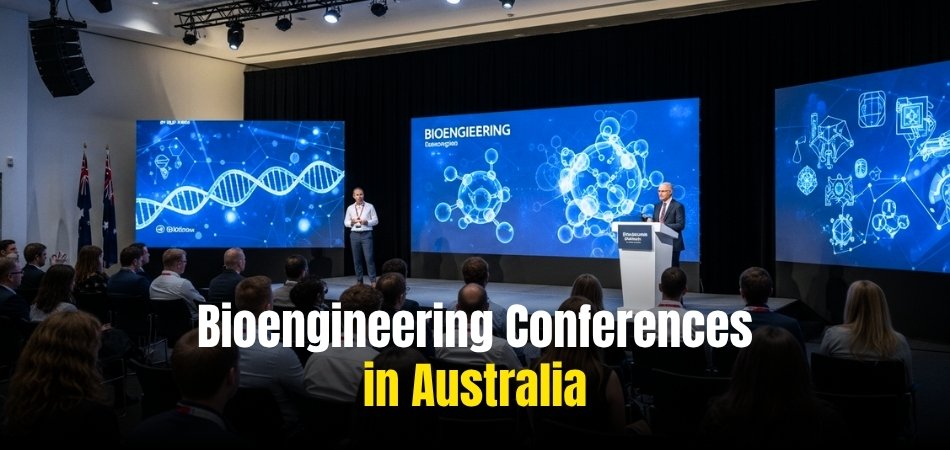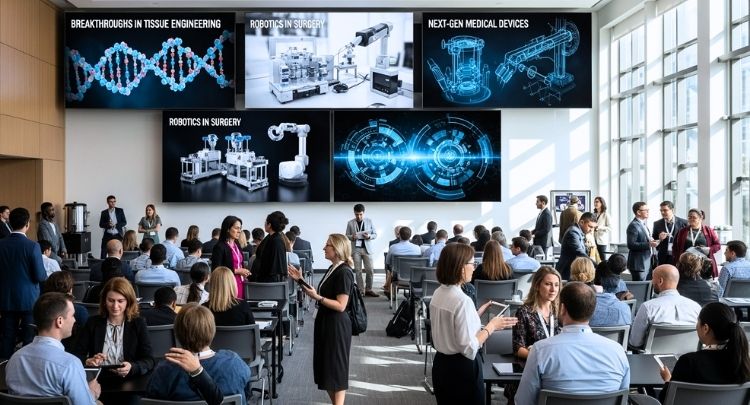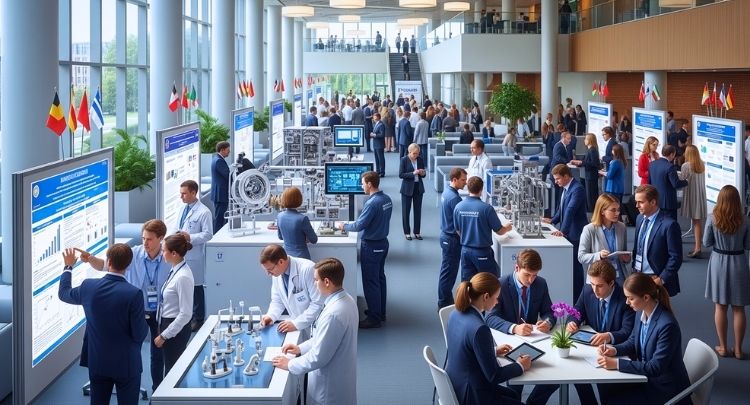Bioengineering is a fast-growing field that helps improve healthcare, medical tools, and new materials. Conferences give people a chance to learn, share ideas, and connect with others in the field. In Australia, many events bring together scientists, students, and experts to talk about the latest discoveries and technology.
Among the top 5 bioengineering conferences in Australia are the 43rd Global Conference on Biotechnology, Bioengineering, and Biomedical Engineering, the International Conference on Biomaterials Engineering, and BioEM 2026. Other key gatherings, such as the Mutational Scanning Symposium and the SMBE NSW Country Technicians Training Seminar and Conference.
Follow this guide to discover the top conferences shaping bioengineering in Australia and find the one that best matches your research goals or career interests.
Top 5 Bioengineering Conferences in Australia
| Dates | Conference Name | Location |
| November 14–16, 2025 | 43rd Global Conference on Biotechnology, Bioengineering, and Biomedical Engineering (GCBBBE) | Sydney, Australia |
| September 9–10, 2026 | International Conference on Biomaterials Engineering | Melbourne, Australia |
| March 25–27, 2026 | 9th Annual Mutational Scanning Symposium | Melbourne, Australia |
| June 21–26, 2026 | BioEM 2026 (Bioelectromagnetics) | Cairns, Queensland, Australia |
| March 22–25, 2026 | SMBE NSW Country Technicians Training Seminar and Conference | Albury, NSW, Australia |
1. 43rd Global Conference on Biotechnology, Bioengineering, and Biomedical Engineering (GCBBBE)
The 43rd Global Conference on Biotechnology, Bioengineering, and Biomedical Engineering (GCBBBE) will be held in Sydney from November 14–16, 2025. This big event gathers scientists, doctors, and engineers to talk about health technology and medical progress. Like many leading conferences in Australia, it offers students a chance to hear about the newest machines, treatments, and research in bioengineering. It is a great place to learn what is changing in medicine and how science can save lives.
2. International Conference on Biomaterials Engineering
Researchers, doctors, and engineers will meet in Melbourne on September 9–10, 2026, to explore how biomaterials are transforming healthcare. Discussions will cover artificial bones, medical implants, and drug delivery systems designed to help patients heal faster. It’s an event that turns complex science into practical insights for improving lives.
3. 9th Annual Mutational Scanning Symposium
Scientists and genetic researchers will come together in Melbourne from March 25–27, 2026, to discuss how even the smallest DNA changes can impact health and treatment. This event focuses on how small changes in genes can affect diseases and treatments. Scientists share research about genetics and how it can help doctors find better cures. It is an important conference for understanding how DNA and mutations play a role in human health.
4. BioEM 2026 (Bioelectromagnetics)
The BioEM 2026 conference will be in Cairns, Queensland, from June 21–26, 2026. It focuses on bioelectromagnetics, which is how electricity and magnetism affect living things. People attending will hear about new studies on medical devices and treatments using electromagnetic fields. This event shows how technology like MRI machines and therapies is helping doctors see and heal the human body.
5. SMBE NSW Country Technicians Training Seminar and Conference
Technicians, lab workers, and educators will meet in Albury, NSW, from March 22–25, 2026, to strengthen their skills through hands-on workshops and shared learning. This gathering is great for technicians who support bioengineering labs and research. It highlights the importance of hands-on skills, training, and sharing new methods. Attendees will enjoy workshops and talks that make learning easy and practical. It is useful for anyone interested in lab and fieldwork.
What the Australian Bioengineering Conferences Have to Offer?
Bioengineering events in Australia give people a unique chance to learn about science and health technology. These gatherings connect students, researchers, and professionals from many places and fields. Each event focuses on clear themes that help everyone understand new ideas. Here’s what you’ll get.
Learning From Experts
- Leading speakers explain their work in ways that are simple to understand, making complicated topics much easier.
- Experts share results from their latest studies, helping people discover how new science turns into real treatments.
- These talks allow students to ask questions directly, making them feel part of exciting and useful discussions.
Hands-on Workshops
- Workshops give real practice with new machines, letting people see how tools in hospitals work every day.
- Students try simple experiments guided by teachers, learning how science works outside the classroom in real ways.
- Sessions also teach skills like lab handling and research safety, which are very important for future careers.
Networking Opportunities
- Conferences let students meet doctors, engineers, and researchers, giving them great contacts for their learning path.
- Talking with professionals helps people understand career choices and gives clear guidance about future job directions.
- Meeting peers from different cities builds friendships, while also opening doors for study help and shared projects.
Cutting-edge Research
- Presentations show new medical discoveries, explaining how fresh technology makes healthcare better for people worldwide.
- Researchers share breakthroughs in tissue growth and genetics, creating awareness of future treatments for tough diseases.
- Attendees explore studies about smart devices, showing how simple machines improve daily patient lives in hospitals.
Career Guidance
- Career talks explain study paths, giving young learners confidence about how to move forward in education.
- Speakers discuss job options in research labs, teaching students how to prepare for interesting scientific careers.
- Special sessions share information about scholarships, internships, and funding, giving many learners clear opportunities to grow.
Global Connections
- Conferences bring people from different countries, letting students learn how science is shared across world borders.
- International guests describe global challenges, teaching learners how scientists in various regions solve complex problems.
- Such discussions highlight collaboration between nations, showing why shared work makes progress faster and more reliable.
Future of Medicine
- Talks on robotics and digital health explain how technology is shaping the hospitals and treatments of tomorrow.
- Sessions about genetic studies highlight how tiny DNA changes can affect health in very big ways.
- Discussions of biomaterials reveal how simple things like artificial bones can completely change surgery success rates.
How Does the Bioengineering Conference Affect the Bioengineering Sector?
Science and medicine keep changing with new ideas that shape the way people live healthier lives. Events bring together curious learners, skilled experts, and leading researchers who all want to share simple knowledge. These conferences give space for discussion, questions, and practical examples. Here is how these conferences impact the bioengineering sector.
Sharing New Knowledge
Conferences help experts explain their latest research in a simple and clear way. Students and teachers listen to updates on technology that can improve health. These talks make difficult topics easier to understand for everyone. They show how new discoveries move from labs into real medical use.
Building Teamwork
Scientists, doctors, and students all meet at the same place during these events. Working together builds strong connections between people from different fields. These connections make research faster and more effective. Learning as a group helps solve bigger problems in health and medicine.
Inspiring Young Learners
Young students who attend these conferences feel inspired to study science more seriously. They see real examples of how ideas can change lives. Listening to experts gives them motivation for future studies. This encouragement can push them toward exciting careers in science and health.
Improving Healthcare Tools
Talks often focus on machines, devices, and methods that doctors can use to treat patients. Engineers show how tools become smaller, safer, and easier to use. These ideas make hospitals better for patients and doctors. New designs directly improve the quality of medical care.
Boosting Research Growth
Conferences also help researchers get ideas for their next projects. By hearing about studies from different countries, they learn faster. These new ideas keep the field of bioengineering strong and growing. The results later improve healthcare and scientific understanding across the world.
Connecting Globally
Many conferences invite speakers from other nations, creating a global learning stage. People share how health problems are solved in different regions. This knowledge helps local scientists think of better solutions. Global connections keep bioengineering linked and strong everywhere.
Shaping the Future
Every conference looks at what the future of medicine and bioengineering could look like. Discussions include robots, genetics, and tissue engineering. These topics give everyone a glimpse of what might be possible soon. It shows how today’s ideas will become tomorrow’s treatments.
Types of People You Will Find at the Bioengineering Conferences
Conferences are lively places filled with people who bring different skills, ideas, and questions to share. Everyone comes together with the goal of learning and teaching something new. These events give a chance to meet many inspiring personalities. Here are the types of people you’ll find at these conferences.
Researchers and Scientists
Researchers attend to present their latest discoveries in bioengineering. They share ideas on genetics, biomaterials, and medical devices. Their talks give clear information about how science is moving forward. Students and teachers learn how these studies connect directly to improving health.
Doctors and Surgeons
Doctors join to see how new technologies can help their patients. They explore tools that make surgeries safer. Conferences give them practical knowledge for hospital use. Their presence links science with everyday medical practice.
Engineers and Technicians
Engineers show designs for machines used in hospitals and laboratories. They explain how these tools are built and improved. Technicians often discuss how to handle equipment safely. Together, they make science more practical and useful for real life.
Students and Learners
Students attend to listen, ask questions, and gain fresh knowledge. They see role models in scientists and doctors. These events inspire them to work harder in their studies. Conferences give them motivation and confidence to chase big goals.
Professors and Teachers
Teachers come to guide their students and update their own knowledge. They often join discussions and workshops. By doing so, they bring back new lessons for classrooms. Their role makes sure learning continues beyond the conference.
Business and Industry Experts
Industry people attend to look for fresh ideas that can turn into real products. They meet researchers and discuss partnerships. Many come to find technology that can improve healthcare. Their role helps move science into the market quickly.
International Guests
Guests from other countries often bring unique perspectives. They share how science is applied in their homeland. Their talks highlight global problems and creative solutions. This adds a worldwide view to the conference discussions.
How to Create a Strong Impression Among Other Attendees at a Conference?
Conferences are not only about talks but also about the people you meet along the way. Making a strong impression helps others remember you for the right reasons. Small actions and habits can leave a long-lasting positive effect. Follow these tips to make a strong impression on others at the conferences.
Dress Smartly
- Wearing neat and suitable clothes shows respect for the event and helps others take you seriously.
- People notice effort in appearance quickly, and it often makes conversations easier and more confident.
- Comfortable clothing still matters, because it lets you stay relaxed while meeting people and attending sessions.
Listen Actively
- Paying attention when someone speaks makes them feel valued, building trust during conversations almost instantly.
- Good listening skills help you remember details, making follow-up talks more meaningful and enjoyable.
- Asking simple questions about what you heard shows that you respect the speaker’s time and thoughts.
Speak Clearly
- Using easy words and a steady tone keeps your message simple, so everyone understands what you say.
- Sharing short examples helps explain your point, making conversations more lively and interesting.
- Avoiding complicated words ensures people stay connected with your thoughts and enjoy the exchange better.
Join Discussions
- Taking part in group talks shows that you are open to ideas and willing to share.
- Asking friendly questions during discussions highlights your interest and makes people remember your voice.
- Respecting other opinions during debates builds good connections and creates a positive reputation quickly.
Share Ideas
- Explaining your thoughts in a clear way helps others see your interest and knowledge on the topic.
- Simple ideas often start meaningful conversations, allowing you to meet like-minded people with ease.
- Offering helpful suggestions creates respect, and people will remember you as supportive and thoughtful.
Be Approachable
- Smiling when greeting people makes you appear open, creating a friendly atmosphere for conversations.
- Standing confidently without crossing arms signals that you welcome new interactions at any time.
- Making eye contact shows honesty and builds comfort, which makes people stay longer in talks.
Follow Up Later
- Exchanging contacts during conferences lets you continue valuable conversations after the event ends.
- Sending a simple message later shows you remember the meeting and care about the connection.
- Keeping in touch helps build lasting friendships, making conference contacts useful for the future.
Benefits of Creating a Strong Impression at a Bioengineering Conference
Conferences are more than events; they are chances to learn, connect, and be remembered by others. Making a strong impression helps you stand out in the crowd. It also makes people want to know more about you. Every interaction builds an opportunity for the future. Here are some benefits of attending.
Building Confidence
When you create a strong impression, it boosts your self-belief. You feel comfortable talking to new people. Confidence helps you share your ideas more clearly. Others notice your energy and enjoy being part of your conversations.
Gaining Respect
A good impression makes people respect your thoughts and presence. Respect leads to stronger and more meaningful connections. Others trust your words and pay attention when you speak. It makes you look responsible and serious about learning.
Opening Opportunities
Opportunities often come when people remember you in a positive way. Good connections can lead to internships or projects. These chances are important for learning and career growth. A strong impression often brings doors you never expected.
Learning More
When people notice you, they share more knowledge with you. Experts are more open to answering questions. This gives you access to extra details about their work. Strong impressions turn into more chances to learn deeply.
Making Friends
Conferences are not only for professionals but also for new friendships. A warm impression encourages others to connect with you. Friends made at conferences can guide, support, and inspire. These friendships often last beyond the event itself.
Standing Out
Among hundreds of people, a strong impression makes you unique. People remember your face, words, and actions. Standing out helps you get invited to more discussions. It places you in a space where your ideas matter.
Creating Future Links
A positive impression keeps connections alive long after the conference ends. People will contact you again for advice. These links grow into lasting partnerships in study or work. Future links often start with one good first meeting.
Common Mistakes to Avoid While Looking for a Conference in Australia
Finding the right conference can be exciting but also confusing if not done carefully. Many people rush the process and overlook key details. This leads to wasted time, missed opportunities, and sometimes money spent on the wrong event. Knowing the common mistakes helps avoid such problems and ensures a better experience.
- Ignoring Event Dates: Checking the conference dates late often leads to missed chances. Planning early ensures travel, stay, and schedules remain stress-free.
- Overlooking Location: Choosing an event without checking the city can create travel troubles. Always check transport, stay options, and safety first.
- Not Reading Agenda: Skipping the agenda review hides important topics you may miss. A quick read ensures sessions match your learning needs.
- Forgetting Registration Deadlines: Missing early registration can increase fees or block entry. Always track registration dates to secure your place on time.
- Following Wrong Sources: Trusting random websites can give incorrect details about events. Always use official conference sites for reliable and updated information.
- Neglecting Budget Planning: Not checking costs early may cause last-minute problems. Calculate registration, travel, and stay before committing to any event.
- Skipping Networking Goals: Attending without clear networking plans reduces the value gained. Decide early who you want to meet and connect with.
Key Preparation Tips for Taking Part in a Bioengineering Conference in Australia
Conferences bring people together who are interested in science, technology, and new ideas that can change health and medicine. Preparing well before attending makes the whole experience smoother and more useful. Planning carefully helps you gain more from each session. Small steps before the event can make a big difference later.
Know the Agenda
Start by reading the event agenda to understand the topics that will be covered. Knowing the schedule helps you pick sessions that match your interests. It also saves time, so you don’t miss important talks. A clear plan gives you confidence during the event.
Prepare Questions
Think of a few simple questions about the subjects that interest you most. Asking them during talks shows your curiosity and focus. Speakers usually appreciate questions that are clear and respectful. It can also help you start a good conversation afterward.
Carry Essentials
Bring items like a notebook, pen, and a charged phone or tablet. Writing notes makes it easier to remember details later. Having your device ready lets you take quick pictures of slides or schedules. Being prepared avoids small troubles during the day.
Practice Introduction
Prepare a short introduction about yourself, including your name, school, and interest in bioengineering. A clear introduction makes meeting people easier. Practicing in advance saves nervous moments when starting a conversation. It shows confidence and makes others take notice.
Dress Neatly
Wear clean and comfortable clothes that look presentable. Neat clothing gives a good first impression to other attendees and speakers. Comfortable wear ensures you can focus on learning instead of worrying about your outfit. Dressing right balances respect and comfort.
Connect Early
Look for online groups or pages linked to the conference. Joining them before the event helps you get to know participants. Sometimes you can even arrange to meet them at the event. Connecting early builds friendships and makes the conference friendlier.
Rest Well
Good sleep before the conference keeps your mind fresh and focused. Tiredness can make it harder to listen and learn. Rest also gives you the energy to stay active all day. Feeling alert helps you enjoy the experience more.
FAQs About Top Bioengineering Conferences in Australia
Bioengineering conferences are important platforms where experts, students, and researchers come together to share ideas and discoveries. They cover topics like medical technology, biomaterials, and healthcare innovations. Here are some frequently asked questions to help you learn more.
What Makes Australian Bioengineering Conferences Special?
Australian bioengineering conferences are special because they mix global knowledge with local innovation. They focus on real-world healthcare problems, advanced technologies, and student learning. These events also highlight Australia’s role in scientific progress, bringing international experts together in one space.
Who Usually Organizes These Conferences?
Most bioengineering conferences in Australia are organized by universities, research institutions, and international scientific groups. Some are managed by Global Conference Series, while others come from local scientific bodies. This ensures a mix of worldwide expertise and regional focus.
Do These Conferences Cover Only Bioengineering?
No, these conferences often include related fields like biotechnology, biomedical engineering, biomaterials, and regenerative medicine. The mix of subjects helps participants learn across disciplines. It creates more opportunities to understand science, technology, and medicine as interconnected fields with shared goals.
Are These Events Open To International Participants?
Yes, most bioengineering conferences in Australia welcome international participants. They provide chances to share global research, learn from diverse experts, and explore worldwide perspectives. Attending from outside the country also builds strong global collaborations and scientific connections for the future.
What Can Students Gain From Attending?
Students gain knowledge of current bioengineering research, new technologies, and practical learning. They also get to meet professionals, professors, and peers, creating helpful connections. For many, these conferences are a motivating step toward careers in science, health, and technology.
How Often Are These Conferences Held?
Most bioengineering conferences in Australia happen once a year, while some run every two years. The schedules depend on the organizers. Regular events ensure attendees always learn updated information, explore new discoveries, and stay informed about the latest progress.
Do These Conferences Include Workshops?
Yes, many of the events feature workshops alongside regular talks. Workshops allow participants to practice with equipment, learn lab techniques, or discuss case studies. This makes the experience interactive and practical, helping people understand science beyond just presentations.
Which Cities Host The Most Events?
Sydney and Melbourne host the largest number of bioengineering conferences in Australia. They have strong research universities, medical centers, and large venues. Other cities like Brisbane, Cairns, and Toowoomba also host important events, offering regional variety in choices.
Are Scholarships Or Discounts Available?
Some conferences provide discounts for students, early registration, or group entries. A few even offer scholarships for young researchers. These benefits help make attendance easier, encouraging more participation from students and professionals interested in bioengineering and healthcare technology.
How Can Someone Stay Updated About Events?
People can stay updated by checking official conference websites, research institutions, and academic newsletters. Many events also share updates through social media and mailing lists. Regularly following trusted sources ensures you never miss important dates or registration deadlines.
Final Words
Conferences in Australia give people a simple way to learn, share ideas, and meet others in bioengineering. These events gather doctors, scientists, students, and engineers to talk about health, technology, and medicine. The top 5 bioengineering conferences in Australia cover topics like genetics, tissue engineering, and medical tools.
Each one is useful for learning about new science and building future opportunities. Attending helps people gain knowledge, make friends, and see how bioengineering is changing lives. Even joining one of these events can create great chances for learning and growth in an easy and exciting way.









